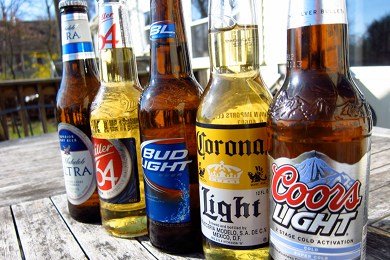
Beer and the Power of Branding
One of the benefits of being a professor at Kellogg is that you get to participate in student events. Recently the Brew n Q club invited me to join them for a beer tasting. I shared some thoughts on branding in the beer industry to kick things off, then we sampled the beer. The event was an entertaining reminder of the power of brands.
The Results
The first tasting featured three mainstream brands: Bud Light, Coors Light and Miller Lite.
Prior to the tasting, the group strongly favored Coors Light; 52% indicated that was their favorite. Bud Light was a distant second with just 26% of the vote, and Miller Lite came in third with 24%.
After the tasting, however, things changed. Few people could tell the difference between the beverages; only about 20% of the panel could correctly identify which was which. The favorite beer was Miller Lite, with top scores from 43% of the panelists.
The second round featured some additional beers, including value brands Keystone Light, Busch Light and Miller High Life Light. Curiously, after having just realized that they actually preferred Miller Lite on an unbranded basis, Coors Light remained the clear favorite in the pre-tasting poll. It captured 46% of the vote.
This second tasting was even more confusing for people. Nobody was able to correctly identify the six options, and every beer received at least 10% of the vote. Bud Light was the favorite but not by much.
The Power of Brands
The event demonstrated why branding is so important.
First, branding can provide differentiation even when products are virtually identical. The Kellogg panel strongly supported Coors Light despite the fact that most people couldn’t tell one beer from the next.
Second, branding can override product inferiority. The panel continued to state a preference for Coors Light despite the fact the product itself wasn’t better. If anything, people preferred the taste of other brands.
Third, brand preference can endure even in the face of conflicting information. The panel didn’t score Coors Light well on an unbranded basis, but supported the brand despite this evidence.
Brands are important for every business, and they are a primary success driver for many. Creating sustainable differentiation is hard. A strong brand is one way to make it happen.
There are similar taste tests done with vodka, where the best vodka is supposed to be the one with the least taste (flavored vodkas excepted) and the Brand winner is the premium brands but the participants cannot discern a difference in the quality or taste. Yet the price difference ranges by a multiple of 4 or more. (e.g. Grey Goose versus a private label) Yet everyone will say that they prefer Grey Goose even after all of the facts are known.
This truly shows the value added benefit of Branding. Two psychologists, Daniel Kahneman and Amos Tversky won the nobel price in economics discussing how people may not always make rational decisions. I suspect that there is an extension of that argument that applies to branding.
Fascinating. So it’s all about branding, and ultimately all about marketing, and behind the marketing, money, whether it’s beer or politicians. He who pays the piper the most wins, alas. I admit to buying my own light brand, Amstel, but was once told it’s dumb to buy any “light” or “lite” brand since they just contain more water.
Embarrassing that a Kellogg beer club would hold a taste test among light beers which, almost by definition, have no taste! And I know it’s supposed to be America First, but not to include a single imported light beer (there are several)? You’re an awfully good sport to participate in such an event and leave the grumbling to me.